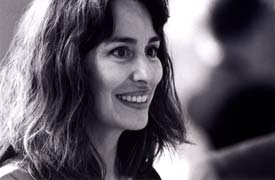
Verónica Murguía
- Mexico
- Zu Gast beim ilb: 2003
Verónica Murguía was born in Mexico City in 1960. She began studying History before deciding to pursue an art degree. For a number of years, she worked as an aerobics teacher, a banana-bread baker as well as a radio talk-show host. Today she works as a freelance writer in Mexico City, teaches at the Escuela de Sociedad General de Escritores de Mexico and writes the column ‘Las rayas de la cebra’ for the daily newspaper ‘La Jornada’ – about her love-hate relationship with the big city jungle she calls home. Murguía has published illustrated children’s books, novels for young adults and a short-story collection for adults ‘El ángel de Nicolás’ in 2003. Right at the beginning of her career, she was awarded the Juan de la Cabada Prize for her children’s book ‘Historia y aventuras de Taté el mago’ (1990).
Her first book for young adults was published in German in 2001. ‘Auliya’ (1999) is a fantastical fairy-tale for ambitious readers, which stands in the tradition of Arabic pr ose. It tells the tale of a paralysed Bedouin girl, who grows up ridiculed by the members of her nomadic tribe and develops curious characteristics . It is a dying stranger on his deathbed, who finally manages to open Auliya’s heart and to free her magical abilities. After his death, the girl decides to leave her unloved home behind and complete Abu al-Jakum’s journey to the ocean. ‘Auliya’ narrates this wonderful journey with im pr essive authenticity, during which the peculiar young girls turns into a ‘magical’ woman. The novel was nominated for the Rattenfänger Literatur pr eis (2002). Carlos Fuentes pr aised the novel as “a magical and noble book”.
No less fantastical is the Mexican’s second book for young adults ‘El fuego verde’ (1999), which was published in German in 2003. Once again the author turns to a time long gone and a far-away culture and with it confirms her intention to write, to live in another time amongst other people. The story begins as a classical medieval novel and develops into a magical tale about thirteen year-old Luned, who lives in the forests of Brocelandia. She goes to the city with the travelling storyteller Demne, where she learns to read and write. Repelled by the many people, the cold city walls and the exclusion of the poor and sick, she decides to return to her village. On her way home, she meets the elf Alder, whom she follows to the kingdom of elves, fairies and goblins. Finally, Luned will have to decide whether her home is in the forest, amongst the elves and forever in the realm of Fairy where everyone is immortal, or to go back to Demne, to the world of men, where everybody, sooner or later, gets old and dies.
© international literature festival berlin
Historia y aventuras de Taté el mago y
Institutio Nacional de Bellas Artes
Mexiko, 1991
El guardián de los gatos
Eco/Conaculta
Mexiko, 1995
Mors Repentina
Verdehalago
Mexiko, 2001
Las aceitunas de Alí Jocha
SM
Madrid, 2003
Aladino y la lámpara maravillosa
SM
Madrid, 2003
[Ill. Mikel Valverde]
Alí Babá y los cuarenta ladrones
SM
Madrid, 2003
[Ill. Mikel Valverde]
Las babuchas de Abukassem
SM
Madrid, 2003
La noche de Scherezada
SM
Madrid, 2003
Simbad el marino
SM
Madrid, 2003
[Ill. Mikel Valverde]
Das grüne Feuer
Nagel & Kimche
Zürich 2003
[Ü: Ilse Layer]
El ángel de Nicolás
Ediciones Era
Mexiko, 2003
Stimme des Wassers: eine magische Reise durch die Wüste
dtv
München, 2004
[Ü: Ilse Layer]
Übersetzerin: Ilse Layer
